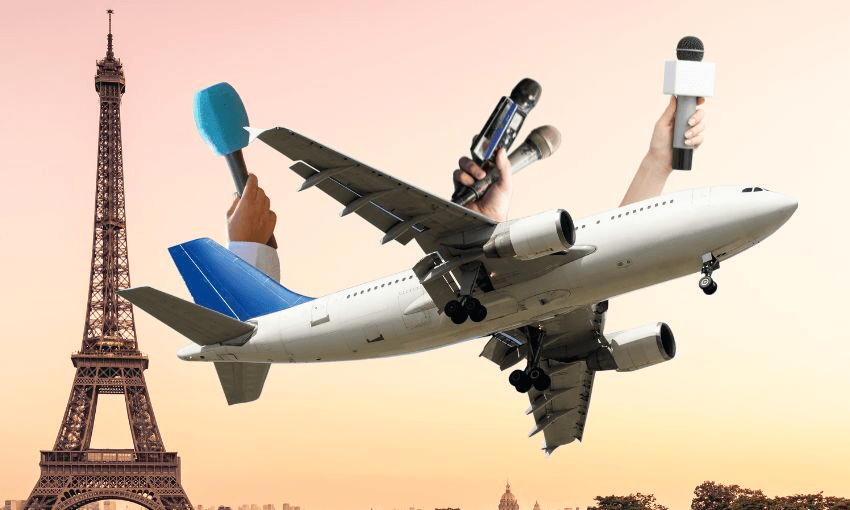With the Olympics wrapping up, New Zealand’s press is leaving Paris. Now, ‘unparalleled’ Paralympics coverage is all on one reporter.
Wall-to-wall Olympics coverage has dominated New Zealand’s news cycle since the games kicked off on July 26, capturing every New Zealand victory, scandal and cool shooter. Now the global competition has ended, its sibling tournament, the Paralympic Games, will begin on August 28. As New Zealand’s Olympians pack their bags, reporters and camera crews will be following suit – with only one New Zealand journalist flying in to cover the Paralympics for the nation’s biggest broadcaster.
In July, TVNZ promised “unparalleled” coverage of the 2024 Paralympics, with five pop-up channels dedicated to Paralympics coverage on TVNZ+ and a nightly programme on TV1 from 7.30pm hosted by Scotty Stevenson and NZ’s most decorated Paralympian, Sophie Pascoe – which a TVNZ spokesperson said was the broadcaster’s “primary focus”. The broadcaster will also air Grit & Glory: The Road to the Paralympics, a documentary focused on New Zealand’s Paralympians, on August 24.
But despite this, TVNZ will have only one reporter and one camera person in Paris to cover the event. That’s compared to the 11-strong team leaving Paris after covering the Olympics, for which it was not the local broadcaster (that was Sky). This number included European correspondent Mei Heron, four camera operators including one already based in Europe, a producer and five reporters: Chris Chang, Jordan Oppert, Michelle Prendiville, Guy Heveldt, Harata Brown and Henry McMullan. For the Paralympics, 1News will have just one reporter present, Victor Waters, plus a camera person.
TVNZ has partnered with Paralympics New Zealand and Attitude Pictures to provide coverage of the tournament since the 2016 Rio Paralympic Games, and its coverage this year is also supported by funding from NZ On Air and a Toyota sponsorship. In 2021, its coverage of the Tokyo 2020 Paralympics brought streaming figures to nearly 750,000. The spokesperson defended the lone reporter assignment, citing the scale of the tournament compared to the Olympics.
“It’s worth noting that there are 195 Kiwi athletes in the Olympics vs 25 Kiwi athletes in Paralympics so in terms of scale, it is a smaller event for our 1News team to cover.”
That comparison appears stark but it’s also worth noting that 78 of our Olympians competed across just five team events (men’s and women’s sevens, men’s and women’s football and men’s hockey). All 25 Paralympians are competing individually, many in multiple events.
In June, NZME was announced as another media partner to the Paralympic Games, with Newstalk ZB being the official radio partner and the New Zealand Herald the official print and digital partner. A press release described NZME’s coverage as an opportunity to “[raise] awareness of these inspiring athletes, and [follow] the team’s journey in Paris”. But a spokesperson for the media company said that while three New Zealand Herald reporters were sent to cover the Olympics, no reporters would be on the ground for the Paralympics.
After holding its first tournament in Rome in 1960, the Paralympic Games have been held every four years, on the same calendar year as the Olympics. In 2001, the International Olympic Committee (IOC) and International Paralympic Committee (IPC) signed an agreement that saw the Paralympics automatically included in the bid for the Olympic Games, beginning after the 2008 Summer Games in Beijing and 2010 Winter Games in Vancouver. This agreement ensured the Paralympics would always follow shortly after the Olympics in the same host nation, using the same infrastructure and offer of subsidies for athletes.
Despite having fewer athletes at the Paralympics and a shorter history, New Zealand’s Paralympians have been more successful than their Olympic counterparts. For the 55 gold, 35 silver and 53 bronze medals won by New Zealanders at the Olympics, Aotearoa’s Paralympians have won 96 gold, 66 silver and 70 bronze medals. This year’s Paralympics has 594 medals to win across 22 sports compared to the Olympics’ 32 sports and 329 medals. Team New Zealand has competed in 23 sports at the Olympics this year, while the NZ Paralympians will be competing in eight sports.
Suggestions have been made in the past to merge the two events in the interest of generating greater publicity for the Paralympics, but a merge would not only overwhelm resources, it would also diminish or “drown out” the importance of the Paralympics and normalise the athletic feats, IPC president Andrew Parsons has argued. The 2024 Olympics saw New Zealand athletes collect the most golds in our history of the competition. If New Zealand’s Paralympians pull off the same feat, will there be enough reporters to share the news?

